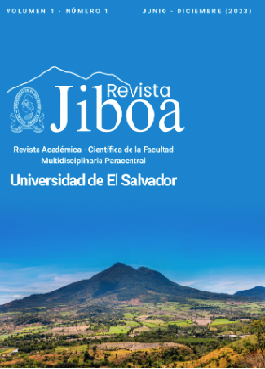Caracterización socioeconómica y política de las mujeres del territorio Bajo Lempa y Bahía de Jiquilisco
DOI:
https://doi.org/10.5281/zenodo.10045639Palabras clave:
mujeres, características demográficas, subsistencia familiar, participación, salud sexual y reproductivaResumen
Objetivo: explorar la situación socioeconómica y política de las mujeres del territorio Bajo Lempa y Bahía de Jiquilisco, que participan en los procesos promovidos por la Asociación Mangle. Metodología: estudio exploratorio realizado con 104 mujeres de 10 comunidades del territorio Bajo Lempa y Bahía de Jiquilisco, en noviembre de 2022. Se elaboró un cuestionario para registrar información demográfica, vivienda y servicios, agua y saneamiento, salud, actividades económicas y dinámica de participación. Se utilizó el programa PSPP para realizar análisis de estadísticas descriptivas. Resultados: La mayoría de mujeres tiene entre 31 y 50 años (56.7%), el 62.5% expresó haber cursado algún grado de primaria, el 92.3% se dedica a labores domésticas. El 76.9% habita en vivienda propia, el 92.3% cuenta con energía eléctrica, el 72.1% tiene servicio de agua domiciliar y el 98% cuenta con servicio sanitario. En su mayoría, no realizan adecuado manejo de aguas grises y desechos sólidos. El 91.3% aseveró que las mujeres de la comunidad se examinan para prevenir cáncer cérvico-uterino y el 68.3% afirmó que se examinan para prevenir cáncer de mama. El 75% de las familias de las mujeres cría aves de corral. Las actividades económicas se realizan principalmente para el consumo familiar. El 70.2% de las mujeres afirmó no pertenecer a alguna organización, aunque el 99% reconoce la importancia de la participación de las mujeres. Conclusión: Las mujeres que participan de forma activa en los procesos promovidos por la Asociación Mangle tienen dos grandes ventajas, la primera es que cuentan con una base material productiva que les permite condiciones básicas para realizar actividades de subsistencia. La segunda ventaja es que tienen conciencia sobre la importancia de la organización y al menos cerca de la tercera parte se encuentra activa en el territorio Bajo Lempa y Bahía de Jiquilisco.
Referencias
ISDEMU. S/F. Marco institucional. Historia. https://isdemu.gob.sv/marco-institucio
Luchsinger, G., & UN Women. (2019) A short history of the Commission on the Status of Women. UN Women.
Navas. C. 2012. Sufragismo y feminismo. Visibilizando el Protagonismo de las Mujeres Salvadoreñas. CIC-UES. 380 p.
ONU. 1982. Cinco estudios sobre la situación de la mujer en América Latina. Chile, 1982. https://repositorio.cepal.org/server/api/core/bitstreams/bda1565c-b1d5-4894-bf0f-44e53b78b0f4/content
ONU Mujeres. (2020). Perfil de país según igualdad de género. https://lac.unwomen.org/sites/default/files/Field%20Office%20Americas/Documentos/Publicaciones/2020/09/Perfil%20de%20pais%20segun%20igualdad%20de%20genero_FINAL-comprimido.pdf
Serret, E. (2007). Estrategia contra la discriminación de género. Análisis y propuestas. Colección “Estudios”, núm. 6. CONAPRED. México. 83 p. https://sindis.conapred.org.mx/investigaciones/estrategia-contra-la-discriminacion-de-genero-analisis-y-propuestas/
UNIFEM. (2009). Mujeres y economías locales, territorios, saberes y poderes. Reconociendo las rutas del emprendimiento desde la geografía
profunda de la américa del centro. UNIFEM, MyDEL. Guatemala. 276 p. https://www.local2030.org/library/69/Mujeres-y-Economias-Locales,-territorios,-saberes-y-poderes.pdf
UN Women. (2014). The World Survey on the role of women in development 2014: Gender equality and sustainable development. https://www.unwomen.org/en/digital-library/publications/2014/10/world-survey-201
Descargas
Publicado
Número
Sección
Licencia
Derechos de autor 2023 Revista Científica Multidisciplinaria Paracentral Jiboa

Esta obra está bajo una licencia internacional Creative Commons Atribución-CompartirIgual 4.0.







